April 2022 2nd Edition
April 2022 2nd Edition tsoana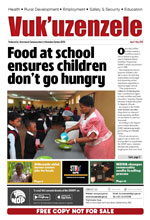
English PDF version
Translations
Afrikaans
isiNdebele
isiXhosa
isiZulu
Sepedi
Sesotho
Setswana
Siswati
Tshivenda
Xitsonga
Celebrating Freedom Month
Celebrating Freedom Month tsoanaMinister of Sport, Arts and Culture Nathi Mthethwa has called on the nation to use Freedom Month to reflect on the country’s democratic gains as the dignity of millions of South Africans continues to be restored.
Addressing the launch of Freedom Month on recently, the Minister said this year’s commemoration will be used to reflect on the progress since 1994.
Freedom month takes place every year in April.
Minister Mthethwa said this year’s Freedom month theme is “Consolidating Our Democratic Gains”. This year marks 28 years since th e dawn of democracy in 1994.
e dawn of democracy in 1994.
He said that under apartheid black people were neglected. “It therefore stands to reason that the provision of basic services such as electricity, clean running water as well as provision of other basic infrastructure to previously disadvantaged communities was at the very core of the first development blueprint,” said Minister Mthethwa.
The 2019 Baseline Survey of the Foundation for Human Rights shows South Africa’s progress since 1994.
According to the survey, 82% of the adult population live in formal housing.
Progress has been made in sanitation, water and electricity.
Minister Mthethwa said only 10% of adults reported to have access to water outside of their yards or their places of dwelling. With regards to electricity, an overwhelming majority of 92% had access to electricity.
Opportunities for young people
More recently, the Presidential Youth Employment Intervention has allowed young people to access opportunities.
Through the National Student Financial Aid Scheme, government has made it possible for a vast majority of the black poor youth to access higher education, which remains one of the foremost channels to break the cycle of generational poverty.
The Minister said that through the geographical names project, government has also deliberately set the country on a path towards healing by changing names of towns and cities.
“Symbolism is extremely important. It is also through symbolism that people feel part of a community and the broader society and geographical name change is one of those potent assistive we have available as a department in effecting the desired social change,” the Minister said. – SAnews.gov.za
Coastal development to create jobs and skills
Coastal development to create jobs and skills SiboneloThe KwaZulu-Natal (KZN) Provincial Government and the eLan Foundation’s Shift Africa have partnered to ensure a multi-billion rand development creates not only employment, but also future opportunities for 100 000 young people.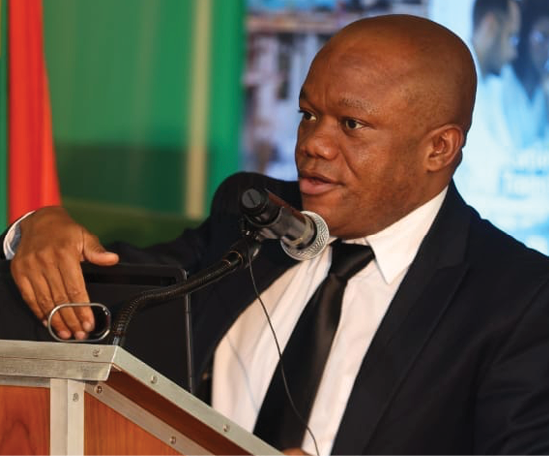
The eLan Foundation is the non-profit organisation of the property and development company eLan Property Group. It was formed in 2019 to improve the lives of communities in which the company operates.
The recent job opportunities are a result of the property group’s R16-billion Blythedale Coastal Estate Resort development in the Ilembe District. The estate will include schools, a shopping centre, a retirement village, a beach resort hotel, upmarket housing and apartments.
The project will also include the construction of 3 000 low-income social housing units.
Speaking at the project launch, KwaZulu-Natal Premier Sihle Zikalala said the project will help reduce unemployment and provide skills training, especially for youth and women. “This will be the biggest resort in Southern Africa and, as such, will yield more business opportunities for Small, Medium and Micro Enterprises (SMMEs).”
He added that the foundation had been provided with a database of young people who have been trained by the Department of Social Development.
He urged business sector to continue working with government to implement high-impact projects that will reduce unemployment and ensure skills development.
eLan Chief Executive Officer Mark Taylor said that the construction of the new estate will provide job opportunities, while the skills development project will equip workers to start their own businesses.
He said the partnership will lead to the incubation of 4 000 small businesses, with guaranteed contracts. “There is also the development of entry-level programmes, which will serve as a gateway to occupationally directed skills development.”
KZN MEC for Social Development Nonhlanhla Khoza said it is up to our generation to demand that leaders from government, business and communities fulfil their commitments, and take action to better the lives of all.
“As we hold hands today as the public and private sector, we are making history and fulfilling that promise.”
She encouraged people to use all opportunities that come their way to empower themselves.
Differently-abled farmer creates jobs for locals
Differently-abled farmer creates jobs for locals SiboneloWheelchair-bound Lydia Nemafhohoni is on a mission to fight poverty and create jobs for people living with disabilities in Vhembe, Limpopo. 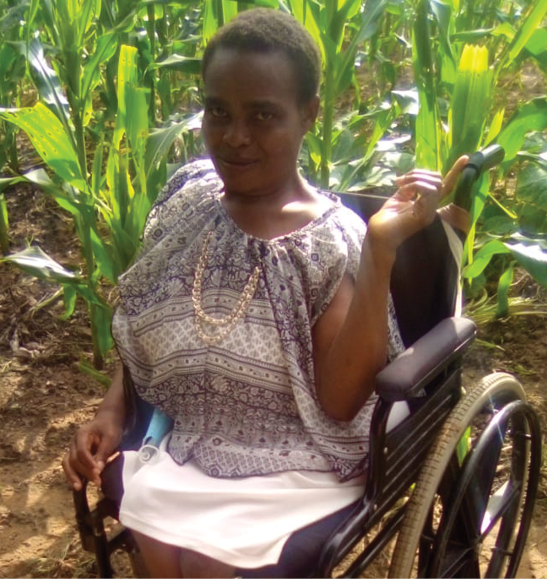
Nemafhohoni (45) is the chairperson of a community farming project called Konanani Disabled People Primary Agricultural Co-operative based in the Pile village in Vhembe.
She was not born with a disability, but during her childhood, she was diagnosed with polio which left her wheelchair-bound.
Konanani is a successful agriculture project formed in 2004. It produces broiler chickens, seasonal vegetables and fruit. It also has a small grocery shop.
“When I started this project, I wanted to show that people who are living with disabilities can do something great; that we can create jobs and that we can be independent and not dependent on grants and handouts,” says Nemafhohoni.
She explains that the project was initially financed through a joint effort by herself and other people living with a disabilities. They saved an amount of R5 000 and then opened a business account.
“We bought seeds, equipment, and such. At present, the money we make from sales sustains the business and the store.”
The project has 10 permanent employees, 11 temporary employees, and 11 seasonal workers.
Government support
The Limpopo Department of Agriculture and Rural Development (LDARD) believes that people living with disabilities should not be overlooked.
The department supports people with a disabilities, youth, and women in agriculture, with extension services, mechanisation, and production input.
\Nemafhohoni says that the government has been outstanding in helping small-scale farmers in her province. “Government, through its various programmes, has to date provided us with R289 000 in funding, chicken feed and fruit and vegetable seeds.”
She is also part of the People Living with Disability in Agriculture and Rural Development initiative in Vhembe, which provides support and training for members.
\"With such support, I can see Konanani growing to be as big as some of our national retailers. We aim to employ more people in the future, and we also would like to create a unique brand for packaging,” she says.
For more information on the People Living with Disability in Agriculture and Rural Development initiative, call 015 294 3000.
Food at school ensures children don’t go hungry
Food at school ensures children don’t go hungry JoyOver nine million children receive a nutritious meal at school thanks to government’s National School Nutrition Programme (NSNP), which was introduced in 1994.
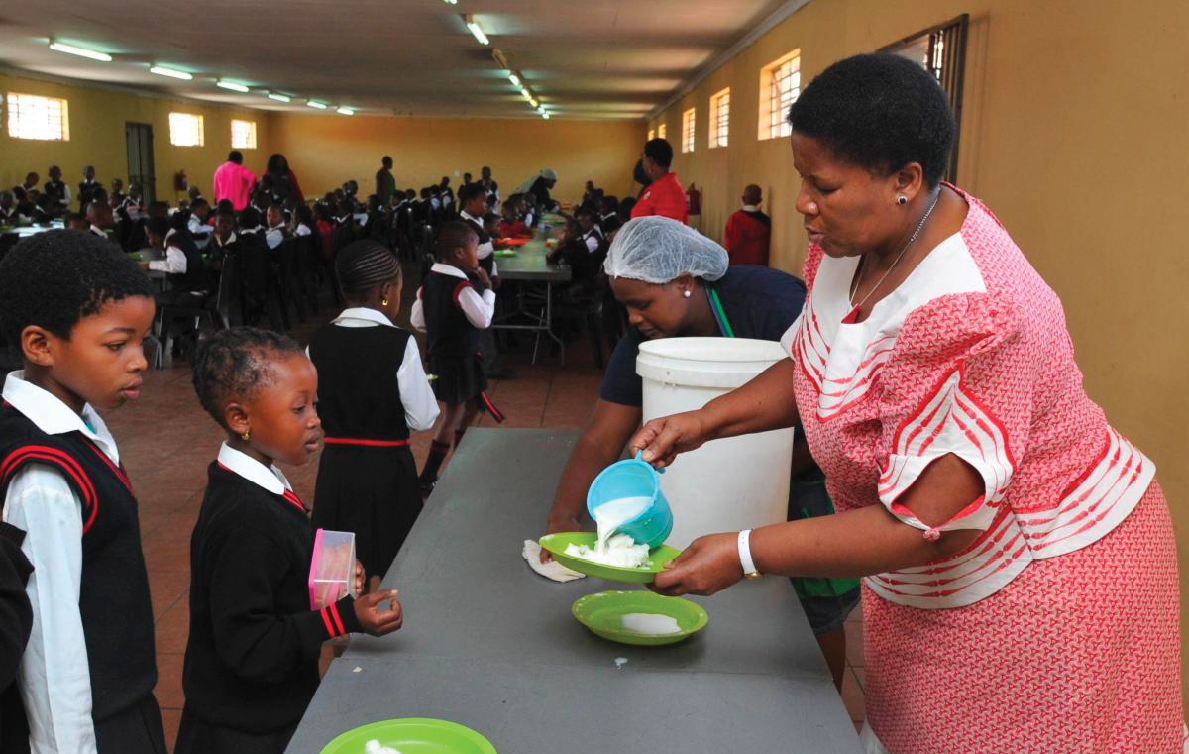 The programme aims to improve children’s ability to learn, by reducing malnutrition and hunger and improving school attendance, especially at disadvantaged schools.
The programme aims to improve children’s ability to learn, by reducing malnutrition and hunger and improving school attendance, especially at disadvantaged schools.
“The programme is critical for furthering learners’ constitutional rights to basic nutrition and basic education,” explains Deputy Minister of Basic Education Dr Reginah Mhaule.
As a result of the NSNP, more children are attending school on time and more regularly, and their concentration in class has improved.
According to the Department of Basic Education (DBE), learners are taught good eating and lifestyle habits.
Schools are also encouraged to set up their own food gardens to supplement the NSNP menu. Learners, teachers and parents are taught grow their own food.
NSNP awards
Thabang Primary School in Bethlehem, Free State, is one of the schools that benefits from the NSNP.
The school recently won the NSNP Best School Award.
The awards celebrate schools’ nutrition programmes by looking at their hygiene and safety practices, nutritious meals, food gardens and nutrition education.
“I am extremely grateful that the school won the award,” says Seyanokeng Sejake, the Thabang Primary principal for the past 24 years.
Thabang Primary School has been running its nutrition programme since 1994. Today, it ensures that its 1 065 learners receive a healthy breakfast daily from a local business.
The food is cooked by unemployed members of the community, who are appointed by the school governing body (SGB).
“Our six employed voluntary food handlers (VFH) make the food provided by the Department of Basic Education through the allocation of funds to the school,” says Sejake.
They VFHs each receive a stipend for preparing the food.
Thabang Primary School took top honours at the awards due to the hard work and commitment of its SGB, management team and functional NSNP Committee, says Sejake.
“Punctuality is the order of the day. We don’t allow absenteeism, without a valid reason, and we have no dropouts. Our learners’ concentration and general performance have also improved,” she adds.
As the prize for winning the award is a state-of-the-art kitchen built by the Tiger Brands Foundation, the school’s nutrition programme is set to become even better.
The school also ensures that there are enough food supplies which are managed properly, to ensure there is always food for the programme.
“For example, we have a food garden that supplies vegetables to supplement the NSNP allocation,” explains Sejake.
Award winners
In the Best Schools category, Grootdrink Intermediate, in the Mgcawu District in the Northern Cape, took second place and Aaron Gqedu Primary School, in Nelson Mandela Bay in the Eastern Cape, came third.
They will receive kitchen equipment from the Department of Basic Education.
The Best District award was won by Umzinyathi (KwaZulu-Natal). The ZF Mgcawu District (Northern Cape) came second and Metro North (Western Cape) came third. Each district won office and computer equipment.
In 2020/21, the NSNP provided meals to children at 21 189 schools.
Go with the flow: protect our water
Go with the flow: protect our water tsoana Water and Sanitation Minister Senzo Mchunu has assured South Africans that there is no water crisis in the country, despite it being ranked in the top 30 of the world’s driest countries.
Water and Sanitation Minister Senzo Mchunu has assured South Africans that there is no water crisis in the country, despite it being ranked in the top 30 of the world’s driest countries.
“We do not have a water crisis. What we are experiencing are water management challenges. "We are in a situation where the water supply exceeds the water demand. We can all play our part to preserve this precious resource by using it with the utmost care,” said Minister Mchunu.
He was briefing the media about the state of water in the country.
He said since surface water resources are fully allocated, some of the country’s water supply comes from the Lesotho Highlands Water Transfer Scheme. Surface water is water that is above the ground, such as streams, rivers, dams, wetlands and reservoirs.
Minister Mchunu said that to meet the increase in water demand, his department has gradually increased groundwater use through the groundwater development scheme. Groundwater is water located beneath the surface of the earth.
Groundwater plays an important role in ensuring there is water security in South Africa.
Water polluters
While assuring that the department is hard at work to ensure the successful completion of bulk water projects and to strengthen co-operation between the public and private sector, he said action will be taken against water polluters.
“The Water Quality Management Policies and Strategies for South Africa (2017) identify pollution from wastewater treatment plants and mine operations as the main sources of pollution. We will not hesitate to deal with transgressors in this case,” he said.
Minister Mchunu added that the department is fast-tracking the activities of the Anti-Pollution Task Team to deal with water quality pollution problems.
Lebogang Maseko works for the Department of Water and Sanitation.
Grape grower goes global
Grape grower goes global SiboneloElize Beukes (63) is a Northern Cape farmer with global reach.
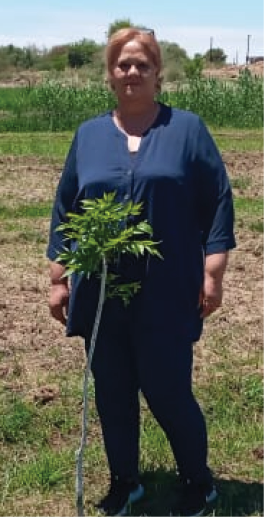 She farms grapes which are turned into raisins.
She farms grapes which are turned into raisins.
Beukes exports her raisins to the United Kingdom.
Situated in Eksteenskuil just outside of Upington in the Northern Cape, Beukes has an eight-hectare farm. Two hectares are dedicated to growing grapes.
In January she harvested 93% and 73% of the expected yield from her choice-grade raisin grapes and golden raisin grapes, respectively.
The raisins are exported thanks to an offtake agreement she has with processing company Red Sun-Dried Fruit and Nuts.
Wine grapes and lucerne are also produced, says Beukes, who is grateful for the donation of lucerne seedlings from the Northern Cape Department of Agriculture, Environmental Affairs, Rural Development and Land Reform.
Raising jobs
According to the department, raisin grapes’ peak season provides employment for 30 000 to 35 000 seasonal workers.
The MEC for Northern Cape Department of Agriculture, Environmental Affairs, Rural Development and Land Reform, Mase Manopole says raisin grape farmers like the Beukes family contribute about
R2 billion annually to the country’s economy.
“South Africa earns foreign currency from these farmers as 90% of all produce is exported.
“More than 30 000 people work permanently in the South African raisin industry, in the Orange River Valley vineyard belt. If one considers an average household size of five individuals, then the total reach of the South Africa raisin industry (indirectly) impacts 150 000 individuals,” Manopole says.
Beukes hires 12 people during harvesting season, and two seasonal workers during planting season.
Chief Executive Officer of Raisins South Africa Ferdie Botha says thanks to the Northern Cape Orange River Valley vineyards belt’s contribution, the raisin industry has doubled over the past eight years.
Botha says that various private and public sector developments have seen the volumes of raisin grapes grow from about 40 000 tonnes in the 2011/2012 season to 85 000 tonnes in the 2019/2020 harvest season. The harvest is expected to reach 100 000 tonnes of raisin grapes in the 2023/2024 harvest season.
He says the global trend towards healthier eating provides an opportunity to grow the industry even more. “Raisins are versatile and can be used in a wide variety of food products, such as a natural sweeteners,” he adds.
Farmers may call the Northern Cape Department of Agriculture, Environmental Affairs, Rural Development and Land Reform at 087 630 0387 to see if they qualify for support.
Haircare queen turns heads
Haircare queen turns heads SiboneloYoung and vibrant entrepreneur Paula Maseko (27) is making a name for herself and her successful organic haircare business Buhle Bomqhele, which she launched in October 2020 at the height of the COVID-19 pandemic.
Maseko launched the brand to make caring for natural hair easier, as she knows the struggle that women with natural hair go through.
“Preparing for work or school takes hours, only for women to be told their hair is unprofessional or too untidy. I want to help more women embrace their crowns,” she explains.
The Buhle Bomqhele range includes a shampoo and conditioner, hair cream, and growth oil.
“We will also launch a leave-in conditioner and beard oil soon.”
Maseko has been part of the Mafikeng Digital Innovation Hub for 18 months, benefitting from mentorship and completing a business course.
In July 2021, she was able to assure customers of her range’s quality when she received R21 505 from the Small Enterprise Development Agency (Seda) to have her hair cream and hair growth oil tested.
“The results came back compliant,” she confirms.
While the haircare range is produced in her mother Loretta’s garage in Lonely Park, Mahikeng, in the North West, she hopes to find a factory soon.
“We have purchased a mixing machine to produce products on a bigger scale,” she says.
Maseko learnt her skills from her aunt Rosemary, who used to help her with her hair when she was young.
The herb rosemary is now one of the natural ingredients used in Maseko’s products, along with thyme, ylang-ylang and moringa.
Before launching her business, Maseko was studying and receiving an income from tutoring students. She holds an undergraduate degree in environmental science and an honour’s degree in chemistry, both from North-West University.
“I am completing my Masters in Chemistry and, in a few months, will be pursuing a PhD in Chemistry (drug discovery).”
To aspiring entrepreneurs, she says believe in yourself and start that business.
“You can do it. That idea you think is too silly could be the next big thing. Apply for funding if you need to, and use the money you’ve been saving to build your dream company.”
As for the future, Maseko aims to release more products and launch a Hydro Comb that she’s inventing at the Mafikeng Digital Innovation Hub. “Our customers can also look forward to a haircare accessory line,” she says.
The company now employs 10 people, including eight sales representatives and two ambassadors.
The Buhle Bomqhele range is available online at www.buhlebomqhele.com
For more information about Seda contact 0860 663 786. If you need assistance from the Mafikeng Digital Innovation Hub call 087 153 2141
Helping women heal
Helping women heal tsoanaA non-governmental organisation (NGO) is making strides in the fight against gender-based violence and femicide (GBVF) in Mthatha, Eastern Cape.
In 2021, the National Development Agency (NDA) gave the Umtata Women’s Support Centre (UWSC) R300 000 in funding for its Masiphunge Women Empowerment Programme (MWEP).
The programme provides a safe space for women to heal and promotes physical and spiritual well-being. In addition, women are recruited as GBVF whistle-blowers in their communities.
UWSC Programme Director Kholiwe Nongauza says the MWEP, though various courses focuses on prevention through the justice system, care, healing and economic oppor tunities.
tunities.
“We have seen significant changes and growth in all the women, particularly the women of Ntshabeni village, who have even mastered our last module that deals with forgiveness,” she says.
The programme operates in the villages of Baziya, Mpheko, Tabase, Ntshabeni, Msana and Bumbane.
A fresh start
A former victim of GBV, Sinenjongo Makhanda (39) from Ntshabeni, says Masiphunge taught her how to bake, which enabled her to earn an income.
“Masiphunge came to us and healed us in many ways, even our hearts. We are better and stronger and are healing – the scones we sell after undergoing a baking course are our bread and butter,” Makhanda says.
National Development Agency Provincial Manager Nokulunga Skeyi says the funding that was given to the NGO has made a significant difference in the lives of GBV victims and members of the communities where UWSC is active.
“The OR Tambo District Municipality was identified as a hotspot for GBVF. I believe serious work has been achieved through the Masiphunge programme. It is through NDA strategic partnerships and an effective capacity-building programme that we can reach disadvantaged communities and contribute to critical causes such as GBVF,” Skeyi says.
The NDA is also going to support the addition of self-defence classes, while the Department of Social Development has pledged to continue to support these types of programmes in other villages in the district and beyond.
The UWSC was started in 1999 by members of the Young Women Christian Association, which set up the centre because members were being approached by desperate women in need of help.
Contact the UWSC at 065 947 0543.
How to play in the township economy
How to play in the township economy SiboneloGauteng township-based Small, Medium and Micro Enterprises (SMMEs) and informal traders can apply for a share of R450 million from the Township Economy Partnership Fund (TEPF). 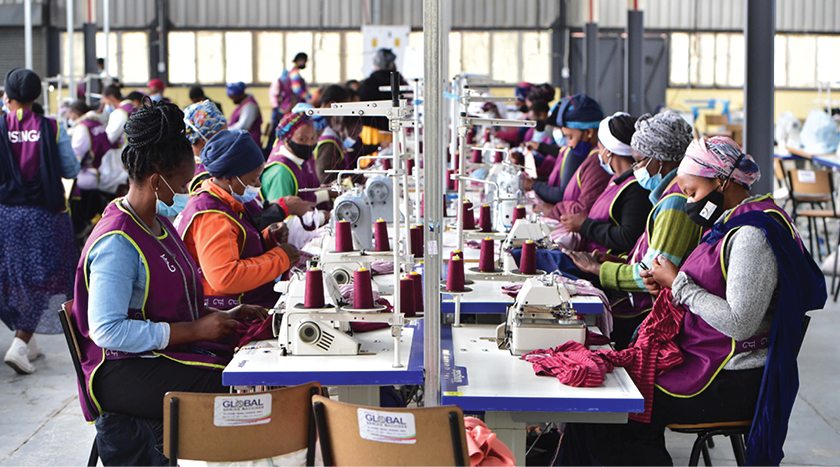
The fund is a partnership between the Gauteng Department of Economic Development (GDED), the Gauteng Enterprise Propeller (GEP), and the Industrial Development Corporation (IDC).
Gauteng has set aside R250 million and the IDC R200 million for the fund.
Beneficiaries will get loans or a combination of a loan and grant of up to R10 million. This amount will differ depending on each beneficiary’s needs and other criteria.
GEP Chief Executive Officer Saki Zamxaka says the opening of the fund follows the recent conclusion of a three-year cooperation agreement between the GDED, GEP, and IDC.
“The TEPF aims to support the sustainability and growth of SMMEs, particularly those based in and linked to the townships within Gauteng.”
Zamxaka says the COVID-19 pandemic and the unrest of July 2021 strained the provincial township economy. “This led to the closure of many businesses and the loss of thousands of jobs.”
The fund will support the township economy in sectors that include – but are not limited to – manufacturing, the taxi economy, ICT and backyard real estate, which includes backyard letting and student accommodation. All beneficiaries must be South African, and the companies must be 100% South African-owned.
The fund has also invited intermediaries to apply for partnerships. Intermediaries are companies that will take on the role of being a link between the fund and potential SMMEs.
"We have invited intermediaries with existing pipelines of SMMEs that require support to also apply," he notes.
SMMEs, co-operatives and start-ups:
- Must have been trading for over a year.
- Must be registered with the Companies and Intellectual Property Commission (CIPC).
- Must be South African Revenue Service (SARS) compliant.
Informal traders:
- Must provide bank statements to prove operations.
- Must provide an original and valid trading permit from the municipality (not from councillors).
- Must be registered and compliant with the CIPC and SARS (assistance available if not registered or compliant).
For more information go to the GEP website www.gep.co.za or visit GEP regional offices. Support will be provided on a first-come, first-served basis until the funds are exhausted.
Improved tax revenue supports recovery and growth
Improved tax revenue supports recovery and growth JoyRecently, the South African Revenue Service (SARS) announced in its preliminary tax revenue collection outcome that it had collected over R1.5 trillion between April 2021 and March 2022.
This a 25% improvement over the previous year and a 15% increase over the last year prior to the COVID-19 pandemic.
Over the same period, SARS also paid out its highest amount in tax refunds since it was established 25 years ago.
A competent tax revenue collection agency is at the heart of building a capable state.
Tax revenue propels our nation’s development. The money collected by SARS finances service delivery and infrastructure.
Through the R17.8 trillion that SARS has collected since its establishment in 1997, we have been able to build more social infrastructure like clinics, schools and hospitals, upgrade and build new roads, and support society’s most vulnerable through social grants and other measures.
When tax revenue collection systems and their supporting legislation are efficient, uncomplicated and equitable, it incentivises greater compliance.
Restoring stability and credibility in SARS was among my foremost priorities when I was elected President in 2018.
Like a number of other key institutions, SARS had suffered from the ill-effects of state capture, with political meddling, mismanagement and other factors seriously affecting its efficiency. This had the direct consequence of not only undermining taxpayer morality, but also loss of business confidence in the organisation.
In 2018, I appointed a commission of inquiry into tax administration and governance at SARS chaired by retired Justice Robert Nugent. The commission delivered its final report by the end of the same year.
 Four years later, SARS has implemented nearly all of the 16 recommendations and 27 sub-recommendations to restore stability to the organisation.
Four years later, SARS has implemented nearly all of the 16 recommendations and 27 sub-recommendations to restore stability to the organisation.
SARS has driven a focused turnaround strategy to position itself at the forefront of efficiency and service excellence. It has a concerted programme to promote tax morality and compliance.
Current high commodity prices, resulting in increased corporate income tax revenues, have contributed to the latest revenue collection windfall. What has also played a role are the steps SARS has taken to improve its information technology and other infrastructure, modernise customs, recruit skilled staff, and combat tax avoidance and criminal activity.
One of the recommendations of the Nugent Commission was that SARS re-establish capacity to monitor and investigate illicit trades.
The Illicit Economy Unit that was reconstituted in 2018 has notched up a number of successes in combating illicit economy trades, including through a focus on customs non-compliance.
Tax collection from JSE listed companies, multinationals and high net worth individuals is now more effectively managed through its Large Business Unit, which was relaunched in 2020.
As a result of SARS’ turnaround there has been improved compliance in personal income tax, corporate income tax and Pay as You Earn.
SARS is taking the wind out of the sails of tax dodgers, beneficiaries of the proceeds of crime, and those involved in corrupt activities. It is well-established that ‘the taxman’ is one of the most efficient tools to combat corruption.
In cases where an individual’s lifestyle does not match what they declare, SARS has been conducting lifestyle audits. In the last year, SARS has completed lifestyle audits that resulted in the collection of a further R474 million.
As we forge ahead with efforts to strengthen the capacity of the state and rebuild institutions that were systematically weakened by state capture, we have much to learn from what SARS has achieved in a relatively short space of time.
When state institutions are well-run and efficient, when they demonstrate credibility and fairness in their operations, this contributes to increasing levels of trust in government. Business and investor confidence also improve, encouraging greater investment and economic growth.
The leadership and the staff SARS are to be congratulated on its performance. Thanks must go to the loyal South African taxpayer. Without their cooperation, the latest revenues would not have been possible. That SARS has expanded the tax base with 1.8 million new registrations over the past year is another sterling achievement.
We can only rebuild South Africa if we continue to meet this shared obligation, and if we intensify the work currently underway to ensure that these taxes are used wisely and efficiently.
Jobs from Isuzu
Jobs from Isuzu SiboneloPresident Cyril Ramaphosa says the new locally manufactured Isuzu D-Max bakkie is a welcome contribution to government’s efforts to rebuild the country’s economy and create jobs.
President Ramaphosa made the remarks at the launch of Isuzu D-Max bakkie in Nelson Mandela Bay, Eastern Cape recently.
The launch is a result of an investment commitment by Japan’s Isuzu Motors Limited, which forms part of the investment drive started by the President in 2018.
The plant will provide over 1 000 jobs and indirectly employ 24 000 people, contributing to community upliftment.
President Ramaphosa said the Isuzu bakkie is an iconic vehicle in South Africa and its brand has long been associated with quality and reliability.
“The fact that this bakkie is being manufactured in South Africa is more than a matter of pride. It is a welcome contribution to our efforts to significantly expand local production as we work to rebuild our economy and create jobs."
He said the automotive industry is one of the economy’s most important sectors.
"It is a significant source of employment and small business development in the Eastern Cape, particularly in Gqeberh.” he added.
The President also commended Isuzu Motors for supporting the localisation goals of the Automotive Production Development Programme. It is anticipated that a local content value of approximately R2.8 billion will be generated through the lifecycle of this programme.
“Isuzu’s manufacturing plant here in Gqeberha, while best known for producing world-class vehicles, also creates jobs and opportunities for many South Africans, and enables local businesses across the value chain to realise their potential."
He said the Isuzu investment together with the approximately R332 billion in investment pledges made at the 4th South Africa Investment Conference will go a long way in supporting South Africa’s economic recovery.”– SAnews.gov.za
Keep children safe online
Keep children safe online JoyWith the world increasingly moving online, it’s important for children to take advantage these opportunities while also staying safe.
 The Government Communication and Information System (GCIS) and Digify Africa recently hosted a webinar with Media Monitoring Africa (MMA) and the Film and Publication Board (FPB) to teach children, educators, parents and the public about how to be responsible online.
The Government Communication and Information System (GCIS) and Digify Africa recently hosted a webinar with Media Monitoring Africa (MMA) and the Film and Publication Board (FPB) to teach children, educators, parents and the public about how to be responsible online.
Phakamile Khumalo, the Programme Manager of Public and Media Skills Development at MMA, said seven out of 10 children who answered questions as part of the SA Kids Online Study said they used the internet without their parents’ permission. Only four out of 10 children said they have some sort of information about online safety.
This shows that children need skills and resources to help them use the internet safely.
Mmaletjema Poto, the FPB’s Child Protection Officer, said parents need to be aware of the dangers their children face online, including viewing child pornography or child sexual abuse, and being groomed by sexual predators.
Children can become the target of online sexual predators by just conducting an innocent internet search and clicking on the wrong link.
Offenders then gain their trust and start grooming them.
“The child is often embarrassed and therefore doesn’t speak about it, which makes it hard for them to get out of the grooming cycle,” said Poto.
She also warned against sharing videos or images of child pornography online.
“It has become a norm to share content on social media. But sharing this type of content is evidence of child abuse. Being in possession of such content or sharing it is a criminal offence,” added Poto.
Help at hand
There are various resources available to help children use the internet safely.
The MMA runs Web Rangers, a digital literacy programme to upskill learners, teachers and parents. Educational videos about cyberbullying, sexting and online grooming, are available at www.webrangers.co.za
The MMA also helps children through its Hashplay (https://hashplay.co.za) website, which includes a social media platform that allows children to talk to an online consultant about what they are experiencing on social media.
Digify Africa has a free Kitso WhatsApp bot that helps children develop digital literacy skills. Visit https://digifyafrica.com/learners-responsible-citizens.
You can report online child sexual abuse or child violence to the FPB by emailing hotline@fpb.org.za or calling 012 003 1400. It can be reported anonymously.
Livestock handling facilities for NW farmers
Livestock handling facilities for NW farmers SiboneloThe Department of Agriculture and Rural Development (DARD) in the North West has handed over 11 animal-handling facilities to farming communities across the Bojanala district.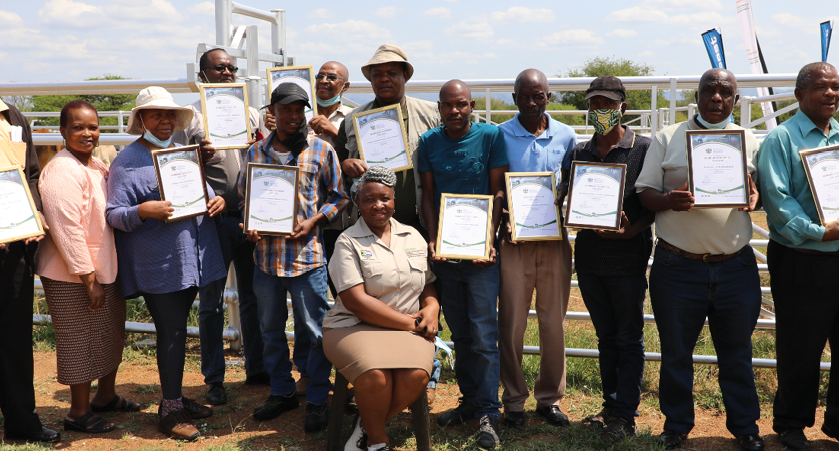
The facilities are worth R5.9 million and they include holding pens, crush pens and animal pest control sprayers. A borehole has also been drilled at the location of each of the facilities to provide water to the farmers.
North West Agriculture and Rural Development MEC Desbo Mohono says the facilities will make the processes of artificial insemination, castration, vaccination, dehorning and the weighing of large and small livestock easier.
“These are all necessary resources that assist farmers with many challenges and provide easier management of their animals,” says MEC Mohono.
She adds that government will keep an eye on the infrastructure to help prevent it from being misused or vandalised.
MEC Mohono says animal healthcare is the backbone of livestock production.
“Animal infrastructure is one of the key factors of the National Agriculture and Agro-processing Master Plan. Creating an enabling environment for farming will not only contribute to improved health of the animals, but also improve food security and create more jobs.”
One of the beneficiaries, Elizabeth Mmatsetse Modise (41), says DARD’s support has made a positive impact in her farming business. “The department-sponsored equipment will help us, business-wise. We will now be able to dip, immunise, load and offload cattle without much hassle.”
Modise, who was taught to farm by her late father, says that the department also provided seedlings and water tanks for irrigation.
“I have now managed to plant and sell vegetables, while also assisting my neighbours and the elderly with vegetables.”
MEC Mohono says the initiative will be rolled out to other districts.
For similar and more opportunities from North West DARD please visit www.dard.nwpg.gov.za or call the following numbers:
Agricultural Support Services: 018 389 5724
Veterinary Service: 018 389 5102/5057
Agricultural Economics: 018 389 5300
Rural Development: 018 389 5432
Looking for a government job?
Looking for a government job? tsoanaLooted fashion designer saved by Sefa
Looted fashion designer saved by Sefa tsoanaDudu Ngubane’s dream of turning her clothing manufacturing company into an international brand was crushed when her business lost R300 000 worth of equipment in the unrest and looting that ripped through parts of South Africa in July 2021.
Durban-based Ngubane owns DU Confidence Designs, which specialises in modern African print wear for fuller-figured women.
The company is now back to full operation, thanks to the R230 000 in funding Ngubane received from the Small Enterprise Finance Agency (Sefa), of which 60% was a non-repayable grant and 40% was a loan.
“I am excited to be fully operational, following access to Sefa’s finance programme,” she says. “Through the support I have received, I have retained eight staff and employed six more people,” adds Ngubane.
After receiving the grant in December 2021, she bought 12 sewing machines, fabric, and branding material.
Ngubane is part of the eThekwini Municipality’s uMkhumbane Entrepreneurial Support Centre, which assists small businesses to apply for funding through Sefa.
As part of the programme, last year she was selected as one of 10 entrepreneurs who were profiled on Hustlers Corner on Business Day TV (DStv channel 412).
The profiles were facilitated by the municipality’s Business Support, Tourism, Markets, and Agri-Business Unit to promote local products to a wider audience.
Ngubane says the exposure she enjoyed as a result of her TV appearance helped her business to grow. She was also given the opportunity to expose her work at the 2021 Durban Business Fair.
DU Confidence clothing can be found at The Space stores at Gateway Theatre of Shopping in Durban, Mall of Africa and Rosebank Mall in Gauteng, and Cavendish Square in Cape Town. The Space enables Africa’s most talented fashion designers to showcase their products at top malls.
Nonduduzo Ngcongo works for the eThekwini Municipality.
For more information about Sefa funding, contact 012 748 9600 or email helpline@sefa.org.za
MDDA changes community media funding process
MDDA changes community media funding process tsoanaThe Media Development and Diversity Agency (MDDA), which supports community radio, newspapers and online digital platforms, has changed its funding application process.
Zukiswa Potye, the Chief Executive Officer of the MDDA, explains that the media will have a set period each year in which to submit funding applications. In the past, local media could make funding applications at any time and these would be processed by the MDDA.
Going forward, once the application period closes, a committee will sift through the submissions and identify media organisations that qualify for funding, she says.
The MDDA is also introducing new funding criteria. Broadcasters such as TV and radio stations now have to be registered as non-profit organisations to be considered for funding.
“Print and online publications can be registered as businesses,” Potye says.
The agency, which received clean audits for the past two years, is fixing some of its administrative lapses, she says.
In the 2020/21 financial year, the MDDA funded only six of the 170 community newspapers that applied for assistance. “This was because MDDA is funded through proceeds from the Government Communication and Information System, commercial broadcasters such as the SABC and Multichoice and donors, so it does not have the big budget that is needed to fund more community media entities.”
The commercial broadcasters are mandated by law to contribute 0.2% of their annual revenue to the MDDA, to enable it to fund community media entities.
Government advertising spend
Government is committed to spending 30% of its advertising budget on community media.
Deputy Minister in The Presidency Thembi Siweya says this commitment helps ensure people who do not read or have access to the mainstream media are kept informed about government programmes and news. It also helps make community media publications and broadcasters economically viable.
The MDDA also provides training on how to run community media outlets, including how running costs can be reduced.
For more information about the MDDA contact 011 643 1100.
Money for jam with eKasiLab
Money for jam with eKasiLab SiboneloGontse Selacoe (23) has turned his knowledge of growing fruit and vegetables into a growing agro-processing company called All Day Jam. 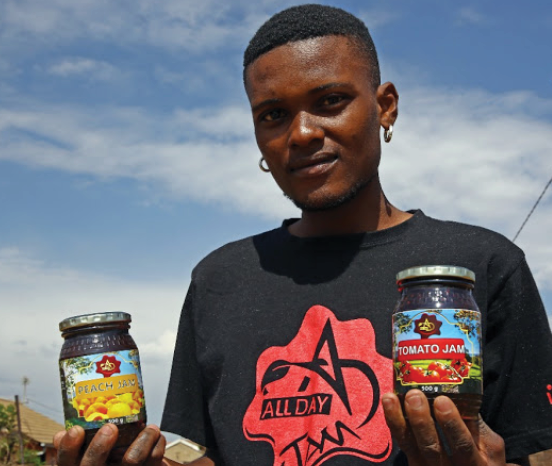
All Day Jam harvests, manufactures and packages four varieties of jam – tomato, melon, peach and pear. Apart from pears, which Selacoe buys, the fruit used is grown in Selacoe’s garden.
Selacoe who is from the Free State, says his grandmother, Mabel Selacoe, taught him how to grow fruit and vegetables and how to make jam.
“My grandmother encouraged us to harvest produce during weekends and school holidays. After the harvest, she would make jam for us at home.”
He admits that he considered the job a chore and not a fun activity, but when his grandmother encouraged him to turn the skills he had learnt from her into a business after matriculating in 2019, he realised the value of her lessons.
“I initially wanted to be a professional pantsula dancer and was planning to buy shoes with the R1 000 I had saved. My grandmother, however, convinced me to instead invest in a business.”
Selacoe used his money to buy jars and stickers for labels. Soon after, he was selling his first jams in his community.
It was through social media advertising that he received an invite to attend a local entrepreneurship webinar, at which he was introduced to the Innovation Hub.
The Innovation Hub is the innovation agency of the Gauteng Province. It is owned by the Gauteng Growth and Development Agency, which falls under the Department of Economic Development.
Government support
“I pitched my business plan to the Innovation Hub and through them, I was enrolled in the eKasiLab programme in Sebokeng, which has given me financial business support and furthered my innovation skills,” he says.
The eKasiLab programme helps with mentoring and assisting qualifying entrepreneurs. The programme has facilities across the five economic corridors in Gauteng, covering areas such as Mohlakeng, Sebokeng, Ga-Rankuwa, Soweto, Thembisa, Alexandra, Mamelodi, Kagiso, Kathorus and Mabopane.
Selacoe says that eKasiLab put him in contact with the Small Enterprise Development Agency, which is providing intellectual property, product development, product testing, branding and packaging support.
“Government assistance has enabled me to dream bigger. I can now see our product being stocked by major retailers,” Selacoe concluded.
For more information about the eKasiLab programme visit www.connect.theinnovationhub.com or www.theinnovationhub.com/business-incubators/ekasi-labs-4 or email info@innovationhub.co.za
NYDA made designer’s dream come true
NYDA made designer’s dream come true SiboneloKwaZulu-Natal-based Zodwa Ndevu (29) is one of the successful beneficiaries of the National Youth Development Agency (NYDA). 
The NYDA's mandate is to support youth entrepreneurship.
Ndevu is the owner of SZ Dream Wear, a fashion design company that specialises in graduation outfits, formal wear, bags, and school uniforms.
She became interested in fashion in 2011 while studying at the University of Fort Hare in Alice, Eastern Cape.
She opened her boutique in 2013 after completing her studies.
“Starting a business with limited resources is not easy. Fortunately, I have hands-on experience in sewing and, as a result, I was able to do most of the initial work,” she adds.
Ndevu applied for the NYDA Grant Programme and was successful.
The grant she received enabled her to purchase a 9-in-1 heat press machine and fabric to make academic gowns.
“I found out about the NYDA on social media and went to their Durban offices to find out more about the different grants they offer. In February 2020, I attended a one-week NYDA training workshop in business management. Following that, I applied for the grant and I received R49 000 in funding in 2021.”
To apply for any NYDA funding you must;
- Be 18-35 years of age.
- Be a South African citizen.
- Live in South Africa.
- Have a skill that can contribute to running a business.
Applicants must:
- Attach all required documentation.
- Supply proof of attending a business management training course.
- Do a 10-minute business pitch – in person or telephonically.
- Pass a due diligence assessment.
Grants range between R200 000 and R250 000 for agriculture and technology-related projects.
For more information, contact the NYDA Grant Programme at 087 158 4742 and/or register on the portal at www.erp.nyda.gov.za
Play fair-score a jab
Play fair-score a jab tsoanaWhile there’s a lot of excitement as fans stream back to stadiums with President Cyril Ramaphosa recently announcing the end of the State of Disaster, only those who have been vaccinated or have a negative PCR test, not older than 72 hours, may enter the stadium.
If you have not been vaccinated and don’t have a negative PCR test (not older than 72 hours), if you can get vaccinated at the stadium and then enjoy the match live, says the Department of  Health.
Health.
As fans return to stadiums, a series of precautionary measures and regulations have to be followed to ensure that all spectators are safe.
Guidelines for vaccinated spectators
- Buy your ticket.
- Bring your vaccination certificate and proof of ID to the stadium.
- If you don’t have your vaccination certificate, download it before the game at https://vaccine.certificate.health.gov.za.
- Social mobilisation teams will be on-site at the stadium to help you download your certificate on your cellphone. You need to bring the code you received after your vaccination.
Guidelines for unvaccinated spectators
- Buy your ticket.
- Bring the results of your negative PCR test with you. The test must not be older than 72 hours.
- If you don’t have a negative PCR test, you can be vaccinated at the stadium.
- If you need to be vaccinated, be at the stadium at least three hours before kick-off.
- After your vaccination, you have to be observed at the vaccination station for 15 minutes.
All spectators must also ensure that they regularly wash their hands with soap or an alcohol-based sanitiser, and wear a mask in indoor public spaces.
Information supplied by the Department of Health.
President commits to change in Mangaung
President commits to change in Mangaung JoyLack of service delivery, corruption, inadequate housing and crime – these are some of the challenges President Cyril Ramaphosa has promised government will address in Mangaung Metro, Free State.
He recently led a Presidential Imbizo to find out about the challenges Mangaung residents face daily. The imbizo was part of the District Development Model (DDM), which is being rolled out to improve the quality of life for citizens.
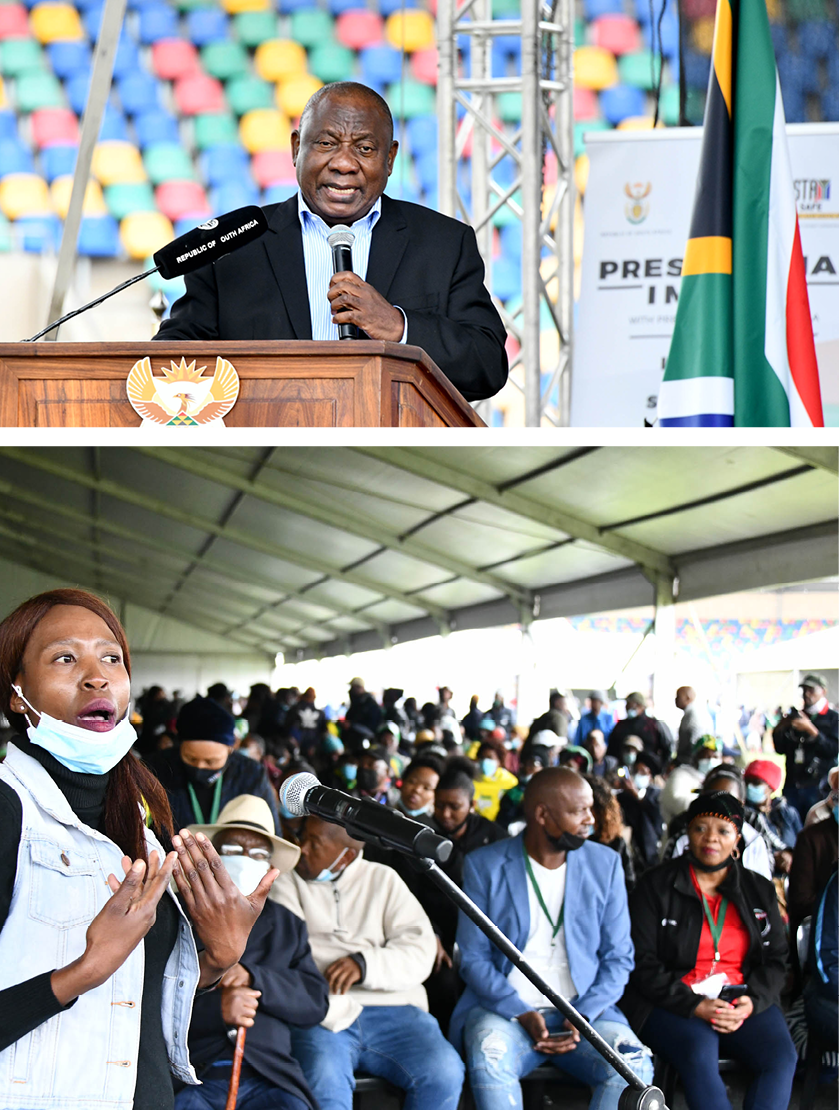 “We have heard your concerns and as government, we are going to address them,” President Ramaphosa said during the community engagement at the Dr Molemela Stadium in Bloemfontein.
“We have heard your concerns and as government, we are going to address them,” President Ramaphosa said during the community engagement at the Dr Molemela Stadium in Bloemfontein.
Cabinet recently approved an intervention by the national executive in the governance of Mangaung Metro, in terms of Section 139(7) of the Constitution.
After the Free State provincial executive failed to put in place a financial recovery plan in the metro, the municipality has now been placed under national intervention.
The Presidency said this intervention is aimed at helping the metro to improve its finances and deliver on its mandate, and to return to sound governance and a better life for residents, the business community and other stakeholders.
During the imbizo, the President assured residents that government is dealing with corrupt officials, and that services will be delivered to the people of Mangaung.
“Change is here… and change is going to continue being present here,” he said.
Residents speak out
Ezekiel Mphahlele, a Mangaung local who attended the imbizo, said he looked forward to government dealing with their long-standing concerns.
“I hope things are going change. The President is going to crack the whip and remove all the corrupt officials in our municipality,” Mphahlele said.
Another resident, Ephraim Lekalakala, said corrupt officials should be removed. “We can’t get employed because these officials want us to bribe them before they employ us,” Lekalakala said.
In his response to concerns about crime Police Minister Bheki Cele assured the community that he will visit the area again.
He said police will arrest criminals, regardless of their nationality.
“We arrest first then ask later where you come from,” the Minister said.
Water and Sanitation Minister, Senzo Mchunu, responded to concerns about blocked sewage pipes, saying his department will fix all worn out pipes.
With regard to the province’s roads, Transport Minister, Fikile Mbalula, said his department has set aside R1.4 billion to fix the province’s roads.
The Minister said the South African National Roads Agency has been asked to assist with fixing roads in the Free State.
Flagship projects
President Ramaphosa also visited key projects in the Free State. This included the Vereeniging Interchange, following the extension of Vereeniging Avenue and the construction of a bridge over the railway line. This infrastructure project was formed to connect different areas and to reduce traffic congestion. This project is estimated to be worth about R59 million and has created about 800 jobs as part of the Extended Public Works Programme.
Residents of Vereeniging said the bridge would improve safety in the area.
The President also visited Motheo Technical Vocational Education and Training [TVET] Artisans College, which is one of the four public colleges in the Free State. It comprises six campuses, including a Centre for Entrepreneurship, Rapid Incubator and an artisan academy.
The college offers courses related to business studies, engineering and will soon include maritime to tap into the Ocean Economy.
Motheo TVET college has also received a number of awards for the work it does.
The awards include the Excellence in Education by the European Business Academy in Lucerne, Switzerland in 2017, Best TVET College in Disability Support in 2018 and the Professional Market Research Diamond
Award which is the highest award focusing on customer service and satisfaction from 2015 to 2021. – SAnews.gov.za
Prevent foot and mouth disease
Prevent foot and mouth disease SiboneloThe Western Cape Department of Agriculture has urged farmers to be careful when buying livestock, due to recent outbreaks of foot and mouth disease in five provinces.
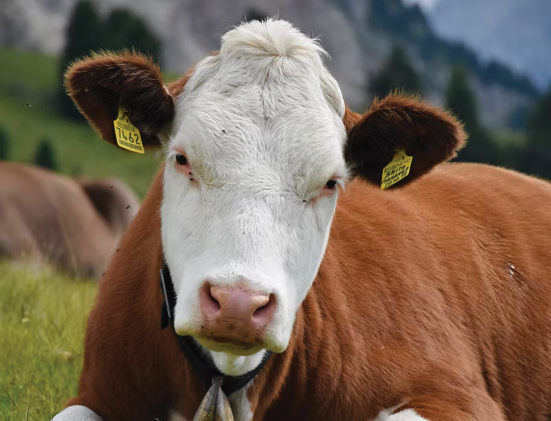 There is a high risk of spreading foot and mouth disease across the country, by moving cattle and other cloven-hoofed animals, following outbreaks of the disease in KwaZulu-Natal, Limpopo, North West, Gauteng and the Free State.
There is a high risk of spreading foot and mouth disease across the country, by moving cattle and other cloven-hoofed animals, following outbreaks of the disease in KwaZulu-Natal, Limpopo, North West, Gauteng and the Free State.
According to Western Cape Department of Agriculture State Veterinarian Dr Vivien Malan, animals can spread foot and mouth disease before they show any signs of disease as it can take two weeks for symptoms to show.
Agriculture, Land Reform and Rural Development Minister Thoko Didiza says ooperation from all stakeholders in the sector is necessary to control the outbreaks of foot and mouth disease.
“It is important that everyone commits and respects all imposed control measures and collectively find a sustainable solution,” Minister Didiza said.
What is foot and mouth disease?
Foot and mouth disease is a severe, highly contagious viral disease that affects livestock such as cattle, pigs, sheep and goats.
The virus is found in animals’ body fluids, including saliva, urine, faeces and milk; and in the air when released by dead animals. Animals get the disease by eating contaminated food or by breathing in the virus.
People can also spread the virus, as it can get onto their clothing, shoes, hands, equipment and vehicle tyres.
Animals that have foot and mouth disease get blisters and sores in their mouth and on their feet. This makes it difficult for them to eat and walk, and often causes drooling.
Farmers then lose money because their animals lose weight, do not grow and produce less milk. Young calves could also die.
Prevent foot and mouth disease
To protect livestock and prevent foot and mouth disease, farmers should:
- Not buy animals if you do not know their origin.
- Only buy from owners with known healthy animals. Ask the seller for a health certificate from a vet.
- Monitor livestock for signs of disease, for two weeks, before mixing them with the rest of your herd.
- Not allow your animals to have contact with other people’s animals.
- Not allow unnecessary visitors onto your farm.
- Disinfect hands, shoes, clothing, vehicles and equipment when entering your farm and when interacting with other animals on your farm.
- Report signs of disease to your local state or private vet immediately.
- Not move or sell sick animals.
Additional reporting by the Western Cape Department of Agriculture.
Contact details for provincial veterinary services are available at https://www.dalrrd.gov.za/Branches/Agricultural-Production-Health-Food-…
Public urged to report brown locust sightings
Public urged to report brown locust sightings ReneilweAgriculture, Land Reform and Rural Development Minister Thoko Didiza has called on the public to alert the department’s nearest district offices when they spot brown locusts.
Minister Didiza said South Africa is experiencing an outbreak of brown locust in the Eastern Cape, Northern Cape and Western Cape since September 2021.
The outbreak tends to escalate due to the amount of rainfall received, and this has resulted in the development of more locusts.
“This locust outbreak is the highest in decades, with more rainfall in the Karoo and nearby areas. The wind is also playing a role in mig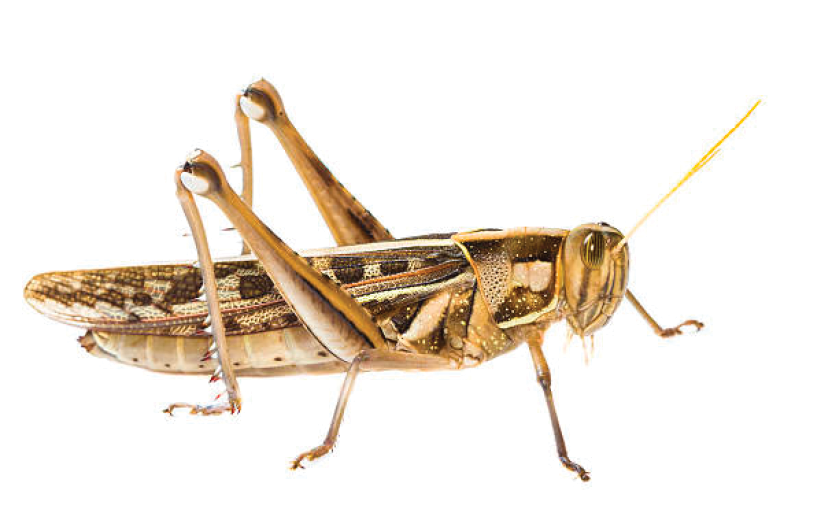 rating the swarms to areas where they have never been, such as the Garden Route area in the Western Cape and on the citrus farms of Kirkwood and Patensie in the Eastern Cape.
rating the swarms to areas where they have never been, such as the Garden Route area in the Western Cape and on the citrus farms of Kirkwood and Patensie in the Eastern Cape.
“It has affected the veld, grazing lands, crops, roads, railway lines and further reported in towns and residential areas,” Minister Didiza said.
The department has appointed ground teams to control locusts in the three provinces. The ground teams include 1 200 controllers and two helicopters that are currently doing aerial spraying, mostly on inaccessible areas and where there are huge locust outbreaks.
To date, the department has spent more than R80 million on locust control. Most of the funds have been spent on insecticide, including spray pumps, protective clothing, payments to controllers and aerial spraying.
Minister Didiza added that the department has established a Joint Operation Committee that meets once a week to discuss locust control issues. The participants include her department; the Agricultural Research Council; Free State, Eastern Cape, Western Cape and Northern Cape officials, and organised agriculture. – SAnews.gov.za
Report sightings of brown locusts to the department of Agriculture, Land Reform and Rural Development officials: Vuyokazi Jongwana on 084 760 8176 and Mulalo Matodzi on 083 326 7773.
Retrenched man ploughs UIF money into own business
Retrenched man ploughs UIF money into own business tsoanaIf you have lost your job and are receiving Unemployment Insurance Fund (UIF) payments, see how best you can use the money to secure your future.
This is what 33-year-old Dakalo Ramalivhana from Muhuyu village outside Thohoyandou in Limpopo did. He was retrenched in 2020 due to COVID-19 and used his UIF money to grow vegetables.
Crop farming comes naturally to Ramalivhana. “My father had a field and we used to work as a family to produce food, so when I was retrenched in Gauteng, I went home to start farming,” h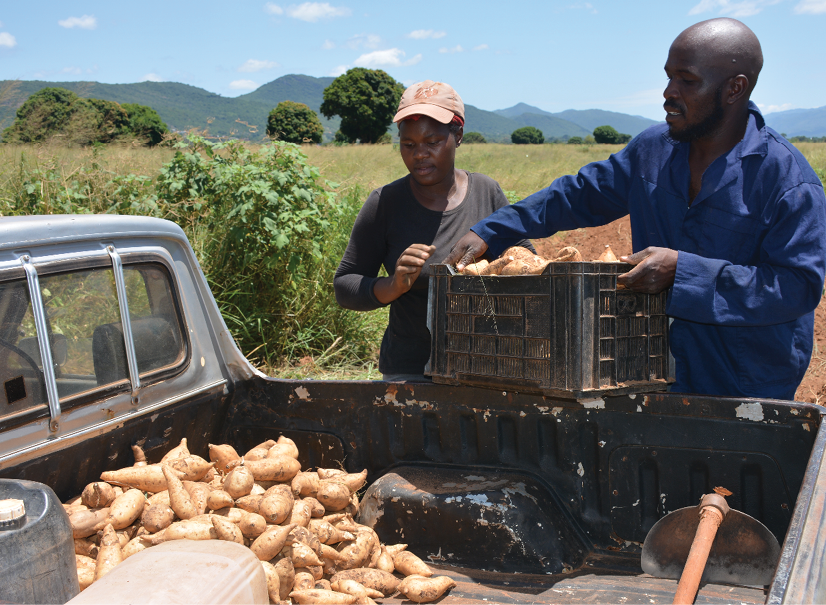 e recalls.
e recalls.
Ramalivhana says that while he had seen UIF deductions on his payslips while employed, he did not know what they meant. “I only found out about claiming UIF when my employer gave me the forms after I was retrenched, and told me to claim at the UIF offices,” he says.
Ramalivhana applied at the Thohoyandou office after moving back home and received a lump sum of R20 000.
He used the money to lease a plot of land and buy what he needed to start farming.
Planning pays off
His long-term planning paid off and today he produces maize, sweet potatoes and groundnuts, which he sells at a local market.
Ramalivhana puts the money left over after meeting his expenses back into the business, which he hopes to grow by planting tomatoes and bananas.
Business has been so good that he was able to buy a bakkie. This has made transporting his produce easier. He has also bought his own land.
Ramalivhana's wife Ndivhuwo now works with him.
He also created jobs for four casual workers, who support their extended families.
Ramalivhana needs to sink a borehole and buy a tractor to enable the future growth of his farm.
“My ultimate goal is to employ many young people in my community. I will register them for UIF and pay their contributions because I wouldn’t be here today without the money I received from the UIF.”
Lungelo Mkamba works for the Unemployment Insurance Fund
For more information about the Unemployment Insurance Fund call 0800 030 007
Rheumatoid Arthritis can be treated
Rheumatoid Arthritis can be treated JoyIf left untreated, rheumatoid arthritis (RA) can lead to long-term joint damage, resulting in chronic pain, loss of function and disability.
 RA is a chronic form of arthritis (joint swelling and tenderness), caused when the body’s immune system (which fights infections) attacks joints by mistake, causing chronic inflammation and damage.
RA is a chronic form of arthritis (joint swelling and tenderness), caused when the body’s immune system (which fights infections) attacks joints by mistake, causing chronic inflammation and damage.
According to Dr Riette du Toit, the Head of the Rheumatology Division at Tygerberg Hospital in the Western Cape, there is a genetic link with the development of RA. But several lifestyle factors could also activate the abnormal immune response, including smoking and poor dental hygiene.
While RA mainly affects women between the ages of 30 and 40, it can also affect men and children.
It typically affects smaller joints, especially in the hands and feet, but can also affect the elbows, knees, shoulders and, in some patients, other organ systems, including the eyes, lungs and skin, says Dr Du Toit.
“Many of our patients go to bed with pain and get up with pain. They find it difficult to grip and hold things, and even the smallest tasks, like washing their hair or dressing, are a struggle,” says Du Toit.
Diagnosing RA
If a doctor suspects that their patient has RA, they will perform a thorough physical examination and order specific blood tests and joint X-rays.
While RA can’t be cured, it can be treated. An early, accurate diagnosis, followed by appropriate treatment, can provide significant relief from symptoms.
Regular follow-ups, with discussions between patient and doctor, remain an essential way to improve disease control and prevent joint and organ damage, says Du Toit.
She adds that taking your medication properly and discussing any concerns or side effects with your doctor is essential.
It’s also important to educate yourself about your condition, through reliable sources such as the Arthritis Foundation of South Africa (www.arthritis.org.za). Also consider joining a support group, where you can share challenges and ideas.
“Stay positive for your family. Continue to use every opportunity to do the things you love. For example, working in the garden on better days," says Du Toit.
If you are concerned that you may have RA, visit your closest healthcare facility.
This information was supplied by the Western Cape Department of health.
What will people say
What will people say tsoanaWhy you should immunise your child
Why you should immunise your child JoyImmunisation is one of the best ways you can protect yourself, your children and future generations from infectious diseases. Child immunisation is important because it helps children acquire immunity, which is biological protection from infectious diseases.
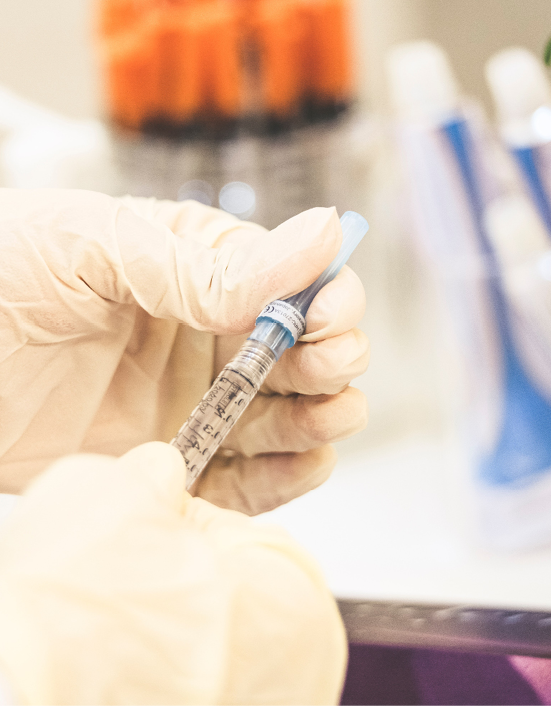 The Expanded Programme on Immunisation (EPI) is one of South Africa’s major public health initiatives. It aims is to prevent deaths and reduce suffering caused by childhood diseases that can be prevented through immunisation.
The Expanded Programme on Immunisation (EPI) is one of South Africa’s major public health initiatives. It aims is to prevent deaths and reduce suffering caused by childhood diseases that can be prevented through immunisation.
“Vaccines are produced by growing bacteria and viruses and then making them less infectious. These are then given to children orally or by injection to produce antibodies by the child’s immune system," explains Professor Dini Mawela, Head of Department for Paediatrics and Child Health at Sefako Makgatho Health Sciences University/Dr George Mukhari Academic Hospital.
She adds that the antibodies protect the child from getting infections or severe disease from bacteria or viruses against which they have been immunised.
How does it work?
Through the EPI, children are vaccinated from birth until the age of 12 years, according to a set schedule.
Vaccination is free of charge at all government health facilities.
“The government provides vaccines against rotavirus (one of the viruses that cause diarrhoea) and pneumococcal disease (such as meningitis, otitis media, pneumonia, bacteraemia),” explains Mawela.
Girls over nine years get vaccinated against the human papillomavirus, which protects them from cervical cancer.
Keeping to the schedule
Dr Thokozani Ngwane, Senior Specialist in Paediatrics and Child Health at Sefako Makgatho Health Sciences University/Dr George Mukhari Academic Hospital, says it is important that children do not miss their immunisation appointments.
“Vaccines not only protect individuals who are vaccinated, but the community at large,” says Ngwane.
While children should ideally have their vaccinations on time, according to the recommended government schedule, if your child misses a jab, it is important to speak to your healthcare worker.
“Healthcare workers will identify all the missed opportunities and plan the catch-up of the missed doses. Each situation involving catch-up is unique and needs to be evaluated on an individual basis,” says Ngwane.
For more information on the EPI, visit your local public health facility or visit www.health.gov.za.
